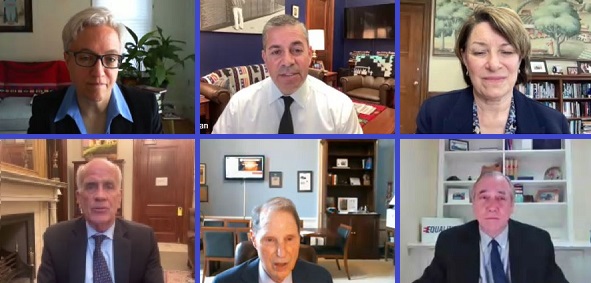Gov. Kotek on SNAP cuts: Oregonians will go hungry
8 min read
Presenter: Oregon’s governor urged Congress to reject proposed cuts to SNAP—the Supplemental Nutrition Assistance Program. Gov. Tina Kotek spoke May 13 during a press event with Democratic senators:
Gov. Tina Kotek: With each drastic change to the nation’s safety net being proposed at the federal level, state leaders like myself have a responsibility to speak up on behalf of their residents. And that’s why I’m here today joining leaders from across the country to speak out against the shortsighted and harmful cuts proposed to the Supplemental Nutrition Assistance Program, cuts that would hit families in Oregon and across the nation very hard, especially now when the cost of living is undermining family economic stability everywhere.
[00:00:44] Bottom line for me is these proposals, $300 billion, means that when Oregonians pay their federal tax dollars, those dollars are not going to be coming back to Oregon where they need it to help the citizens of Oregon.
[00:00:58] And I want to tell you that 89% of Oregonians who receive SNAP benefits are also on Medicaid, also called the Oregon Health Plan here in Oregon. So there is a lot of overlap with our safety net and all of it is under threat right now.
[00:01:14] So before I was governor, I served in the legislature for 15 years. But before that, I fought to help people not go hungry. I worked as an advocate for Oregon’s statewide emergency food bank system.
[00:01:26] I learned directly in that work from our families, our seniors, our veterans, what it means for people to skip meals, to pay their rent, or to pay for their medications, or simply go hungry. I’ve seen the resilience of our communities, but I’ve also seen how fragile food security can be for too many of our neighbors.
[00:01:45] That’s why I’ve spent my career fighting to expand access to nutrition and support for Oregon for every Oregonian regardless of where they live.
[00:01:53] SNAP is one of the most effective anti-poverty and pro-health programs we have in America. It helps over 700,000 Oregonians, more than half of them children, seniors, or people with disabilities. It helps them put food on the table.
[00:02:10] When you cut SNAP, you’re not cutting bureaucracy. You’re cutting a child’s dinner. You’re cutting their breakfast. You’re cutting their family’s dignity.
[00:02:22] Beyond the moral urgency, there is an economic reality to this proposal. More than 3,500 retailers across Oregon take these benefits. Every SNAP dollar generates about $1.50 to $1.80 in economic activity. That’s money spent at grocery stores, farmers markets and local businesses in every corner of Oregon—urban, suburban, and rural.
[00:02:48] When families lose benefits, local economies will take a hit. Jobs are lost, stores will close, the entire community feels it.
[00:02:57] Here in Oregon, we have worked hard to build a food system rooted in equal access and community resilience. However, we can’t do it alone, and we simply do not have the resources that backfill what the federal government has rightly supported for decades.
[00:03:11] These changes are not just unsustainable in a cost shift to states. They are an attack on the food security of millions of hardworking Americans, pure and simple. These changes are just plain wrong. They make it harder for states like mine to do our jobs, to meet urgent needs, and to plan responsibly.
[00:03:32] So I’m here to urge Congress to reject these cuts. Instead, let’s invest in American families and the food security that we know strengthens communities, supports our economies, and reflects the basic decency we owe one another.
[00:03:48] Presenter: Sen. Ron Wyden:
[00:03:50] Sen. Ron Wyden (D-Ore.): The combination of less food assistance for seniors and kids and then Republican cuts in Medicaid is a prescription for a sicker America. You need access to food to be healthy and you need access to timely health care when you’re ill.
[00:04:13] And I consider this an unforced error in terms of generating more hunger in America. It’s an unforced error in denying health care because health care will be more expensive when people like seniors have to go to nursing homes.
[00:04:28] The question of access to food and access to health care are intertwined, and we’ll be damned if we’re going to see that lost in order to give these breaks to the people at the top.
[00:04:39] Presenter: Sen. Jeff Merkley:
[00:04:41] Sen. Jeff Merkley (D-Ore.): Millions of children will lose health care in order to fund tax breaks for billionaires. Millions of children will go hungry to fund tax breaks for billionaires, greatly increasing the funds the states have to put up.
They have to double the amount they put in for admin costs, and states, depending on the calculation, will have to fund 5% to 25 % of the program.
[00:05:05] For Oregon, that would be $400 million, plus or minus. I don’t know that that’s even possible, given everything else that’s happening.
[00:05:13] It’s a good chance that lots of kids will not be able to even study in school. I mean, they’ve gone through COVID, that was a blow, but to go to school hungry—nobody learns anything when they’re hungry. Kids don’t develop right. Their brains don’t develop right. Their muscles don’t develop right without food and nutrition. It’s pretty outrageous, this set of measures.
[00:05:33] Presenter: From Vermont, Sen. Peter Welch:
[00:05:36] Sen. Peter Welch (D-Vt.): It’s much less about a tax cut than it is about a benefit cut. It’s about taking things away from people who need them and depend on them.
[00:05:47] About one in 10 Vermonters are receiving SNAP benefits. And that is our poorest Vermonters, low-income folks, kids. It makes a huge difference in their life that they can have access to SNAP.
[00:06:04] Presenter: From Minnesota, Sen. Amy Klobuchar:
[00:06:07] Sen. Amy Klobuchar (D-Minn.): Local grocery stores also benefit from SNAP dollars. It’s the whole ecosystem. It’s farmers that are growing and producing the food which is part of the SNAP dollars and then of course the grocery stores and then the most important, the people that need the food.
[00:06:25] It also means that local nonprofit community organizations, food banks, schools will be left trying to pick up the pieces. So at a time when the vast majority of Americans are just trying to get by, raise their kids, worry about the cost of living, this is the last time that we should be rushing through a package of unfunded mandates.
[00:06:45] This should be of course done in the context of a farm bill in which we have negotiations of all programs. They’re choosing to do it this way and we are fighting back and standing with the people of this country.
[00:06:58] Presenter: From New Mexico, Sen. Ben Ray Luján:
[00:07:01] Sen. Ben Ray Luján (D-N.M.): Republicans on the House Agriculture committee released their plan, which would push costs on states, a price that many states just can’t afford. It will be devastating to states. It will be devastating.
[00:07:12] In my state, one in four people rely on this program, many of whom are children. If this program is cut at that $230 billion level, it devastates it. And I would argue it jeopardizes the farm bill as well.
[00:07:26] Now, I have a lot of constituents who are farmers and ranchers who carefully plan their farming season around what grocery stores and food banks will need. They spend time based on these programs investing money, securing water resources, and planting seeds.
[00:07:42] Well, now there’s a whole question with what negative impacts to farmers and ranchers are going to exist, based on a program that existed a year ago, Donald Trump decided at the 11th hour to pull the rug from under them and left these farmers and ranchers hurting, in addition to his national sales tax, which he calls tariffs. It’s just, it’s hurting farmers more and more.
[00:08:03] Alice Perez, who heads the Gallup Community Pantry, said, ‘We’re right back to where we started with the SNAP benefits going away. We have families of four living on $200 a month in groceries, where there’s no grocery stores. What’s going to happen to them?’
[00:08:19] Presenter: The Washington Post asked about the push to shift some of the cost of SNAP to states. Do states have the budget to pay for that? Oregon Gov. Tina Kotek:
[00:08:29] Gov. Tina Kotek: Thank you for the question. Look, this is a partnership. It’s a program that works. SNAP is working in states across the country. The way we share, for example, the administrative costs for SNAP is a 50/50 partnership right now. They’re proposing to switch that to 75/25, putting more of the admin on top of the states.
[00:08:51] This is a highly complex bureaucratic program that we need support from our federal partners to make sure we can run the program.
[00:08:59] I can tell you in Oregon, we work really hard to make sure people get paid on time, at the right amount. We need the federal government to stand up and move Oregon’s taxpayer dollars back to our states to support their ability to feed themselves.
[00:09:15] We do not have the kind of money that it would take to maintain the program at the current level if these cuts goes through. It will just not happen, and people will go hungry.
[00:09:25] Presenter: The Oregonian asked if the governor could describe the tangible impacts of the cuts in Oregon. Gov. Tina Kotek:
[00:09:33] Gov. Tina Kotek: The federal government pays 100% of the cost of the food benefit. They’re talking about shifting as much here in Oregon to 25% of that food cost coming to the state of Oregon. We don’t have those dollars here at the state to do that. And that means we’ll have to decide which people will get benefits. I don’t think we can make that choice and shouldn’t have to make that choice.
[00:09:58] The program runs well now. The federal government can pass budgets that fund these programs. We need to feed people first and then you can have all the other conversations you want. But we have to feed people first and that means maintaining SNAP at the benefit levels that we have.
[00:10:14] Presenter: Gov. Tina Kotek joins Democratic senators to urge members of Congress not to allow cuts to the Supplemental Nutrition Assistance Program.
This story produced by John Q for KEPW, an organizational member of the local time bank, at 97.3, Eugene’s PeaceWorks community radio.







